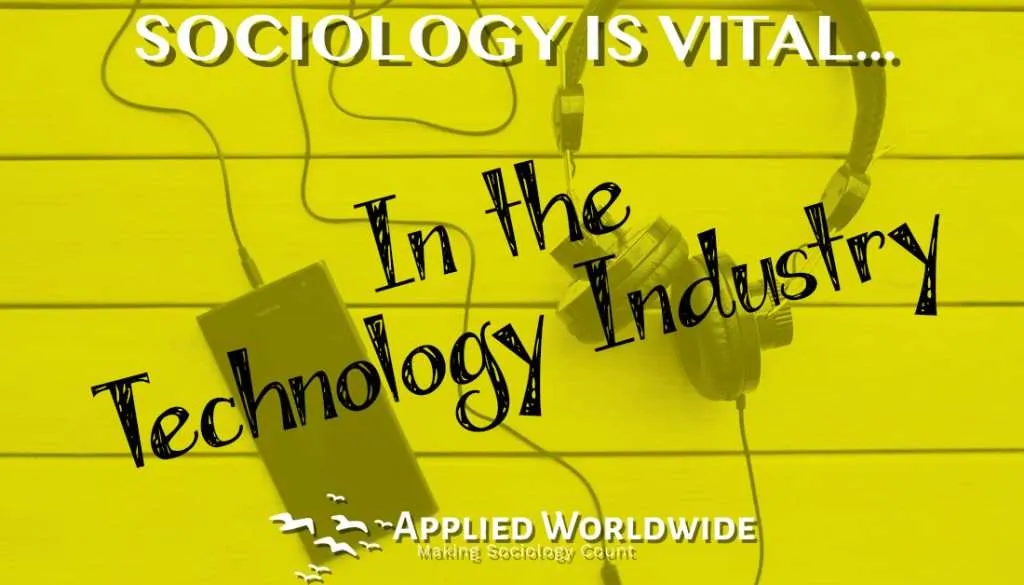Increasingly, computer scientists and leaders in the tech industry are recognizing something sociologists have known for a long time, which is that technology and society are mutually constituted. In other words, society influences tech, and tech influences society. As technology penetrates ever more deeply into our lives, I believe sociologists need to start contributing to technological development and innovation to make that technology better for everyone.

Not only is there a greater social imperative for sociologists to join the tech industry, there is also increasing recognition of the important perspectives that sociologists have to offer. I’m not saying the doors are swinging open to sociologists, but certainly the opportunities exist and are steadily expanding. You just have to know where to look for them. To that end, in this article, borrowing from my experience at Microsoft, I identify some of the less advertised roles in “Big Tech” (we all know about UX research, thanks!) that are well suited to sociologists and explain why we make a great fit.
Top 4 Roles for Sociologists in the Tech Industry
Public Policy
Every large tech company will have a public policy group or what may also be called a government affairs group or a regulatory affairs group that deals with staying on top of the latest policies impacting the tech industry from the local, state, and federal levels to the international levels, particularly for multinational corporations.
They can be based in Washington DC or spread out across the world. Sociologists who study public policy, the state, administration, political sociology, and international relations are all well equipped to understand the policy-making process. They can analyze complex, multi-stakeholder situations while accounting for everyone’s interests and positions. They can bring value by, for example, analyzing the impact that a given policy will have on various social groups that may not traditionally be considered by public policy teams focused on narrower impact to the company or the industry.
For example, Privacy and Ethical AI are hot topics in the tech industry these days, and you can bet that most companies have some sort of policy group in each of these areas to monitor, influence, and respond to any regulatory action. Take a look at the work being done in Microsoft’s Privacy and Regulatory Affairs group as well as their Office of Responsible AI.
Corporate Social Responsibility
Most large tech companies have some sort of corporate social responsibility or philanthropic arm that focuses on doing good in the local and global communities. Here, sociologists who study international development, non-profits, and any number of substantive topics ranging from the environment and sustainability, to criminal justice, or disability, have valuable experience to offer. For example, Microsoft has a Chief Environmental Officer and Google has a Sustainability team that tackle issues around the companies’ global environmental footprint, devise plans on how to reduce that impact, and how tech can be leveraged for things like improving biodiversity or clean energy production.
Those who study social stratification or education might be interested in roles that consider how tech companies can ameliorate the digital divide in education. For example, Microsoft has a broadband access initiative that aims to address this inequity and Google has a whole Google for Education program. Those who study inequities in the criminal justice system would be important in informing how technologies developed for this sector can either alleviate or compound racial and socioeconomic inequities.
Microsoft’s Criminal Justice Initiative addresses some of these questions as does Google’s Global Affairs team. Other initiatives focus on how to develop an international order that respects and promotes peace and cybersecurity through international norms. Microsoft’s Digital Diplomacy team does just that. Yet others focus on preventing human rights abuses through their technology or platforms, as well as protecting fundamental values like democracy. For example, Microsoft’s Defending Democracy program looks at how technology can be used to protect democratic processes like elections and could use the expertise of sociologists who study democratic institutions.
Compliance, HR, Learning
Compliance roles are about helping the business implement the rules that it sets out for itself to comply with a variety of laws and regulations ranging from trade, anti-money laundering, security, privacy, accessibility, online safety and more. While these roles are not research or policy based, they are a great entry point into the industry. Additionally, in HR departments, there is often some focus on diversity & inclusion, in part, because this is an area where tech struggles.
Helping the company understand why women drop out of the workforce or why students of color drop out of STEM is hugely important to improving its recruitment, retention, and promotion policies. Helping the company better understand its organizational culture to uncover why it might not be welcoming or supportive to women or people of color is also important and something for which sociologists of organizations and culture are well suited. Finally, for sociologists really passionate about teaching, there are plenty of opportunities to design and lead training and learning curricula for employees as most companies have internal training and “readiness” programs.
Though we often compete with lawyers in these spaces, many of these roles do not require a legal degree, so don’t shy away from searching in legal departments for “program manager” and “analyst” type roles.
Research
Beyond user experience research that tends to sit within product teams, most large tech companies have separate research groups where engineering research and development takes place, for example Google Research and Microsoft Research. Researcher positions, for example, for those who study social media and social networks abound.
At Instagram, one might be studying how people create multiple social identities on their platform and why, while at YouTube, one might be doing online ethnographies or in-depth interviews of influencers. At Facebook, you might be looking at the types of social media interactions that have the biggest consequences for social well-being. Finally, emergence of new technologies, particularly artificial intelligence, requires sociological perspectives on how this advanced technology will impact various institutions and social groups. For example, sociologists are perfectly positioned to explore how to make AI more ethical and human-centric and how to use AI for societal good.
Though most roles in research are computer science oriented, some explicitly welcome sociologists and other social scientists. Moreover, internships for PhD students and post-docs are available.
Top 4 Tech Industry Skills that all Sociologists Have
Beyond the substantive knowledge in many of the areas I mentioned above, sociologists also tend to have the following skills that are highly valued in the tech industry. You just have to know how to translate your skill set into a language that tech understands.
Growth Mindset
You don’t have to be an expert in technology. When I joined Microsoft, I hadn’t used a Windows computer since high school. However, you do have to be curious and want to learn about technology. As Microsoft CEO Satya Nadella puts it, “The learn-it-all does better than the know-it-all.” And who is better at learning new things than sociologists? The tech industry values curious minds, go-getters who won’t get stuck on a challenging problem. They’ll research it and propose a solution.
Even if you’ve stayed away from technology studies or any sort of applied sociology your whole career, every time you write a paper or a book, your thesis proposes some solution to some problem, even if the problem is purely theoretical. That’s exactly what is expected of tech workers. You might not have the domain expertise yet, but you definitely have the skills to acquire it. Your ability to do research is your growth mindset in action.
Project Management
Academics don’t talk about project managing their research. But completing a multi-year, multi-sited, and multi-method dissertation project requires exceptional project management skills. All of the jobs I discussed above require project management skills because they require juggling multiple priorities, workstreams, and interests simultaneously. They require organizing work so that it gets done, well and on time. Unless your dissertation was about tech, it’s rare that anyone wants to hear about it. But what they do want to hear about is how you managed such a challenging undertaking because that is evidence of transferable skills.
Data-Driven Analysis
Learning complex things is what PhDs in sociology do best. Making sense of huge amounts of data or research and analysing it in support of answering questions or simply gaining insight into a given issue is what we do. We are data and evidence driven and so is tech. And no, you don’t have to be a quantitative sociologist. In fact, in an environment that can often overprivilege quantification and metric tracking, qualitative sociologists can offer a fresh perspective on how other forms of knowledge production might be valuable and why.
Communication
In tech, just as in academia, you have to be able to communicate complex problems to different types of audiences. If you’ve presented your research in grad school, you’ve probably had to adjust the framing and content of your presentation depending on the conference. You were careful to understand the miscommunications that can happen across disciplines. You’ve probably presented to a variety of audiences, including undergraduate students, fellow grad students, professors, and maybe even members of the community.
You’ve probably presented your work internationally, having to communicate across cultural and linguistic differences. Moreover, the ability to be sensitive to cultural diversity and have empathy for and understanding of a multitude of backgrounds across race, ethnicity, nationality, religion, and language is key. Sociologists come into the workplace primed with these sensitivities because we study them as our day job.
Final Thoughts on Sociologists in the Tech Industry
For fear of generalizing and oversimplifying, I’ll conclude with the acknowledgement that not all tech companies are ready to welcome sociologists or even understand what we do, and not all sociologists are necessarily equipped with the right skillset to succeed or want to work in tech. However, what is true is that more and more opportunities exist for sociologists in the tech industry. As technology permeates more and more of our social lives, and the tech sector reckons with its impact on society, those opportunities will only continue to expand.
Dr. Kozlowska finished her PhD in sociology from Northwestern University in 2017. She now works on responsible AI innovation at Microsoft in Seattle. Dr. Kozlowska has mentored many PhD students transitioning to industry, so if you’re interested in a career in technology, please don’t hesitate to connect with her on LinkedIn or Twitter. You can read more about tech & sociology on her blog Global Tech Affairs.








